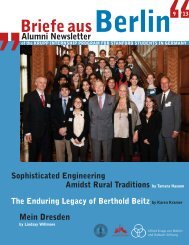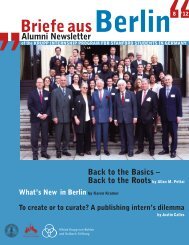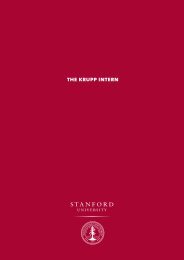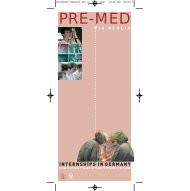Briefe aus Berlin 2009 - Krupp Internship Alumni Newsletter
Briefe aus Berlin 2009 - Krupp Internship Alumni Newsletter
Briefe aus Berlin 2009 - Krupp Internship Alumni Newsletter
You also want an ePaper? Increase the reach of your titles
YUMPU automatically turns print PDFs into web optimized ePapers that Google loves.
How to come back?<br />
Tips for recent alumni:<br />
The Alexander von Humboldt-Stiftung offers fellowships for U.S.<br />
scientists and scholars:<br />
http://www.humboldt-foundation.de<br />
The Foreign Policy <strong>Internship</strong> at the American Academy in <strong>Berlin</strong>: for<br />
graduate students in their Public Policy Program (background in US<br />
foreign policy and international affairs is preferred):<br />
http://www.americanacademy.de<br />
The Robert Bosch Foundation Fellowship Program enables young professionals<br />
from the US to spend a year working in their field in Germany:<br />
http://www.bosch-stiftung.de<br />
The Bundeskanzler-Stipendium für künftige Führungskräfte scholarship<br />
is offered in cooperation with the Alexander von Humboldt-<br />
Stiftung:<br />
http://www.humboldt-stiftung.de/web/bundeskanzler-stipendium.html<br />
The Bundestagspraktikum, formerly called the Internationales Parlaments-Praktikum,<br />
is now a grant. The Internationales Parlaments-<br />
Stipendium (IPS) lasts five months and includes meetings, seminars<br />
and an internship with a parlamentarian:<br />
http://www.bundestag.de/bundestag/europa_internationales/internat_<br />
<strong>aus</strong>t<strong>aus</strong>ch/ips/index.html<br />
The Carl Duisberg Gesellschaft (CDS) provides internships and practical<br />
training opportunities in business, engineering, finance, tourism,<br />
IT, media/communications, international relations, the non-<br />
Mein „Praktikunstwerk“<br />
by Daniel Smith<br />
Work. It is the word I use to describe – no, to simplify<br />
and to categorize – my so-called “internship” or “Praktikum.”<br />
I “work.” I read. I run. I sleep. I have “work” from<br />
9 a.m. to 4 p.m. I usually do not “work” on the weekends<br />
(with the exception of two weekends ago and this upcoming<br />
weekend). Today, I had a busy but good day at<br />
“work,” and tomorrow I plan to “work” until 10pm.<br />
But what is “work?” Apparently, work is what I do,<br />
where I do it, when I do it. So, I work in the Museum for<br />
Islamic Art, which is one of three museums inside <strong>Berlin</strong>’s<br />
most visited museum, the Pergamon. I am a photocopier,<br />
a tea maker, a translator, a graphic artist, a textbook<br />
editor, an academic, a dish washer, a book seller, a<br />
survey solicitor, a wine server, a pumpkin pie maker, a<br />
Wikipedia author, a website designer, a Teetante, a Kaffeetante,<br />
a researcher, an exhibition namer, and a grant<br />
17<br />
profit sector, German studies, economics and other fields for up to<br />
12 months:<br />
http://www.cdsintl.org<br />
The Deutscher Akademischer Aust<strong>aus</strong>chdienst (DAAD) and the<br />
German Committee of the International Association for the Exchange<br />
of Students for Technical Experience (IASTE) help<br />
people find internships:<br />
http://www.daad.de, http://www.iaeste.de<br />
The German-American Fulbright Commission has special programs<br />
for U.S. citizens, e.g. grants for teaching assistantships at German<br />
high schools:<br />
http://www.fulbright.de<br />
The International Cooperative Education (ICE) helps arrange<br />
summer jobs and internships:<br />
http://www.icemenlo.com<br />
The Konrad-Adenauer-Stiftung e.V. (KAS) provides stipends to<br />
German and international graduate students for further education<br />
and graduate work, especially for young people who want to become<br />
leaders in the fields of politics, business, science, media and<br />
culture: http://www.kas.de (see: Service, Stipendien)<br />
YOUNG GERMANY, a career, education and lifestyle guide, lists<br />
institutions offering research scholarships:<br />
http://www.young-germany.de<br />
proposal writer. Occasionally, I am a speaker of German,<br />
and usually always a reader of German.<br />
In my time working with the Museum for Islamic Art<br />
as part of my Praktikum, not only have I unearthed the<br />
general robustness of the word “work” and its utility<br />
in my day-to-day vocabulary, but also of “art” and its<br />
some times – how can I say it? – artful relationship with<br />
“work.” For instance, what is an “artwork?” What is a<br />
“work of art?” In a museum, for a museum, how is “art”<br />
related to “artifact?” Is there a relationship between<br />
“craft” and “work,” “handicraft” and “handiwork?” If<br />
one labels an object as an “artifact,” as a “handicraft,”<br />
as an “applied art,” can he or she still label it as just<br />
plain “art?” How does Art History as a discipline play a<br />
role in discerning meaning, if this is at all possible, from<br />
these various seemingly inscrutable distinctions? From a








